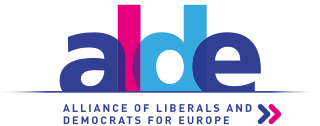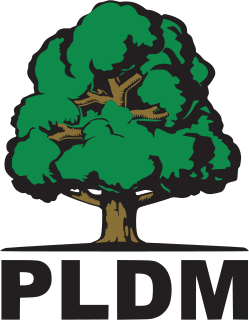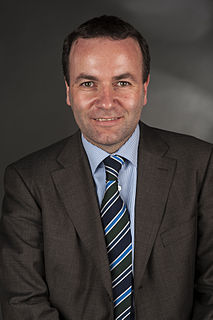Pan-European liberalism has been a political force since the establishment of the European Liberal Democrat and Reform Party in 1976.
Pan-European liberalism has been a political force since the establishment of the European Liberal Democrat and Reform Party in 1976.
PM meeting organised by ELDR and hosted in the official residence of PM Guy Verhofstadt.
| Part of a series on |
| Liberalism |
|---|
 |

The Alliance of Liberals and Democrats for Europe Party is a European political party composed of 60 national-level liberal parties from across Europe, mainly active in the European Union. The ALDE Party is affiliated with the Liberal International and a recognised European political party, incorporated as a non-profit association under Belgian law.

The Party of European Socialists (PES) is a social democratic European political party.

The president of the European Commission is the head of the European Commission, the executive branch of the European Union (EU). The President of the Commission leads a Cabinet of Commissioners, referred to as the College, collectively accountable to the European Parliament. The President is empowered to allocate portfolios among, reshuffle, or dismiss Commissioners as necessary. The College directs the Commission's civil service, sets the policy agenda and determines the legislative proposals it produces. The Commission is the only body that can propose bills to become EU laws.

Democrats 66 is a social liberal political party in the Netherlands, which positions itself in the centre of the political spectrum. It is a member of the Liberal International (LI) and the Alliance of Liberals and Democrats for Europe (ALDE).

The Centre Party, officially the Centre Party of Finland, is an agrarian political party in Finland.

The prime minister of Denmark is the head of government in the Kingdom of Denmark comprising the three constituent countries: Denmark, Greenland and the Faroe Islands. Before the creation of the modern office, the kingdom did not initially have a head of government separate from its head of state, namely the monarch, in whom the executive authority was vested. The Constitution of 1849 established a constitutional monarchy by limiting the powers of the monarch and creating the office of premierminister. The inaugural holder of the office was Adam Wilhelm Moltke.
Venstre, full name Venstre, Danmarks Liberale Parti, is a conservative-liberal, agrarian political party in Denmark. Founded as part of a peasants' movement against the landed aristocracy, today it espouses an economically liberal, pro-free-market ideology.

The Social Democratic Party is the largest social democratic political party in Romania and also the largest overall political party in the country, except for European Parliament level, where it is the second largest by total number of MEPs, after the National Liberal Party (PNL). It was founded by Ion Iliescu, Romania's first democratically elected president at the 1990 Romanian general election.

Sir Graham Robert Watson is a British Liberal Democrat politician who served as a Member of the European Parliament (MEP) for South West England from 1994 to 2014. Watson was the chairman of the Parliament's committee on citizens rights, justice and home affairs (1999–2002), leader of the European Liberal Democrat and Reform Party Group (2002–2004) and the first leader of the Alliance of Liberals and Democrats for Europe Group (2004–2009). From 2011 until 2015 he was the President of the Alliance of Liberals and Democrats for Europe Party. From 2015 to 2020 he was a UK Member on the European Economic and Social Committee. He is currently (2020-22) a Distinguished Visiting Fellow at the University of Toronto's Munk School of Global Affairs and Public Policy.

The European People's Party (EPP) is a European political party with Christian-democratic, conservative, and liberal-conservative member parties. A transnational organisation, it is composed of other political parties. Founded by primarily Christian-democratic parties in 1976, it has since broadened its membership to include liberal-conservative parties and parties with other centre-right political perspectives. On 31 May 2022, the party elected as its President Manfred Weber, who was also EPP's Spitzenkandidat in 2019.

The Alliance of Liberals and Democrats for Europe is a transnational alliance between two European political parties, the Alliance of Liberals and Democrats for Europe Party and the European Democratic Party. ALDE has political groups in the European Parliament, the EU Committee of the Regions, the Parliamentary Assembly of the Council of Europe and the NATO Parliamentary Assembly. There are assorted independents in these groups as well as national-level affiliate parties of the European-level parties.

The Civic Alliance of Serbia was a liberal political party in Serbia.

The political groups of the European Parliament are groups consisting of multiple political parties or legislators of aligned ideologies in the European Parliament. The European Parliament is unique among supranational assemblies in that its members (MEPs) organise themselves into ideological groups, rather than national cleavages. The political groups of the European Parliament are usually the formal representation of a European political party in the Parliament. In other cases, they are political coalitions of a number of European parties, national parties, and independent politicians.

The Democratic Party of Moldova is a centre-left, populist social-democratic political party in Moldova. Established in 1997, the party holds pro-European views, and is an associate member of the Party of European Socialists (PES) and a full member of the Socialist International. According to its statute, the PDM pleads that Moldova is an independent, sovereign, and democratic state, based on law, and integrated in the united family of European democracies. Reflecting former leader Marian Lupu's views, but also the strong influence of the Moldovan Orthodox Church, the party is more conservative on social issues, such as LGBT rights.

The Group of the Alliance of Liberals and Democrats for Europe was the liberal–centrist political group of the European Parliament from 2004 until 2019. It was made up of MEPs from two European political parties, the Alliance of Liberals and Democrats for Europe Party and the European Democratic Party, which collectively form the Alliance of Liberals and Democrats for Europe.

The Liberal Democratic Party of Moldova is a conservative political party in Moldova. The party is led by Tudor Deliu. Until 2016, PLDM was led by Vlad Filat, who was Prime Minister of Moldova from 2009 to 2013, in two cabinets. Immediately after the 2014 parliamentary elections, with 21 seats in the Moldovan Parliament, PLDM was the largest of the three democratic pro-European parliamentary parties.

The 2014 European Parliament election was held in the European Union, from 22 to 25 May 2014.

Morten Løkkegaard is a Danish politician who has served as a Member of the European Parliament (MEP) and the Danish Parliament intermittently since 2009. He has held his current position as a member of the European Parliament since 2016. He represents the Venstre political party and is affiliated with the Alliance of Liberals and Democrats for Europe.

Mátyás Eörsi is a Hungarian politician who was the leader of the liberal Alliance of Liberals and Democrats for Europe in the Parliamentary Assembly of the Council of Europe (ALDE-PACE) Group in the Parliamentary Assembly of the Council of Europe (PACE). He became a member of the PACE in 1994. On 6 March 2009 the Hungarian government nominated Eörsi to Secretary General of the Council of Europe.

Renew Europe is a political group in the European Committee of the Regions bringing together liberal and democrat city mayors, regional presidents and ministers, and local and regional councillors to contribute to the European Union's legislative procedure. The group is the successor to the Alliance of Liberals and Democrats for Europe in the European Committee of the Regions (ALDE-CoR) which existed from 2005 to 2019, which in turn succeeded the ELDR-CoR group which had existed since 1998. The group consists of members from several European political parties, including Alliance of Liberals and Democrats for Europe and the European Democratic Party. The Renew Europe group in the European Committee of the Regions is the sister group of the Renew Europe political group in the European Parliament.